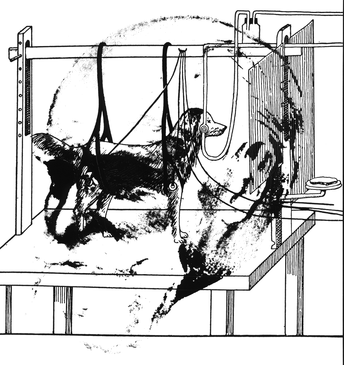Ivan Petrovich Pavlov1849–1936
Pavlov extended the concept of reflexes into the psychological domain. His lifelong interest was in the digestive process, and his study of internal secretions during digestion won him the 1904 Nobel Prize in Physiology or Medicine. His last three and a half decades were spent investigating an incidental observation made during his early experiments - that dogs started salivating in anticipation of food (or dilute acid applied to the tongue) rather than upon ingestion. “Psychical excitation, i.e., the action of a substance at a distance, is exactly the same as when it is in the mouth. It is absolutely the same in all respects. Depending on the kind of food shown to the dog, whether dry or liquid, edible or absolutely inedible, the salivary gland functions in exactly the same way as when these substances are introduced into the mouth.” He investigated these “psychical secretions” by pairing a neutral stimulus (like a bell) with food, and measuring the amount of saliva secreted. Following many pairings salivation occurred to the neutral stimulus alone and Pavlov called this conditioning: food was the unconditioned stimulus and the bell was the conditioned stimulus; salivation to the food was an unconditioned reflex, whereas that to the bell was a conditioned reflex. He interpreted conditioning in terms of excitation and inhibition in the higher nervous system rather than employing any mentalistic concepts. However, his systematic experiments on conditioning have reverberated throughout neuroscience, not only in learning theory but also in the clinical domain (with his studies on inducing experimental neuroses) and in personality and the study of temperament. “All these experiments clearly bring out the fact that a development of a chronic pathological state of the hemispheres can occur from one or other of two causes: first a conflict between excitation and inhibition which the cortex finds itself unable to resolve; second the action of extremely powerful and unusual stimuli.” Pavlov was born in Rayazan in central Russia. He studied medicine in St. Petersburg and later became director of the Medical Military Academy there. He was an indefatigable researcher who paid little attention to the everyday necessities; his wife even bought his shoes for him. “I have received all that can be demanded of life: the complete realization of the principles with which I began life. I dreamed of finding happiness in intellectual work, in science - and I found it.” Pavlov is shown together with detail of the apparatus he used for studying conditioning in dogs; in this instance, the unconditioned stimulus was electrical stimulation of the skin.
